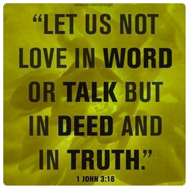
Set a guard, O Lord, over my mouth;
keep watch over the door of my lips!
Psalm 141:3
Words are fast things sometimes
slipping from my mouth
without careful thought
doing damage I never had in mind.
Warned to be slow to speak
I may forget and say
something in a sinful way
causing hurt and pain, showing I'm weak.
But God can protect my speech
obeying His Word's commands
a guard is close at hand
and He can handle what I cannot reach.
Holiness, O God, in what I say
is my prayer in brokenness
heal me, cleanse with burning coal my wickedness
so my lips can honor You today.
Your Spirit must guard my impulsivity
and quiet my heart's strong will
so that in my soul I will be still
and listen to You with peace and tranquility.
Fill me with biblical wisdom rare
so what I think upon
is solid, founded on
Your truth, speaking it, my words are clear.
Set a guard, O LORD, over what I say
so that Your glory I will show...
so that Your gospel I will know...
let Your words leave the door of my lips today.
Amen


















